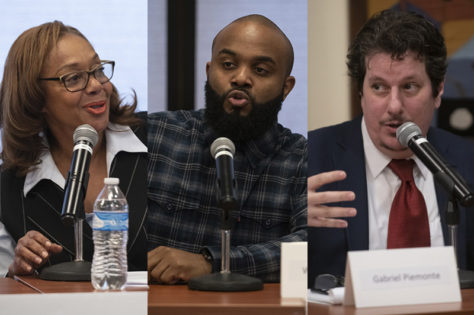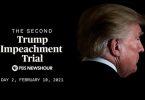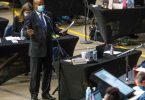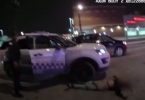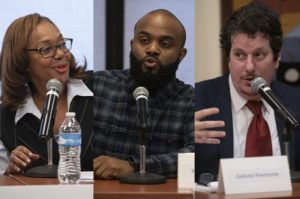
https://hpherald.com/2019/01/16/5th-ward-aldermanic-election-forum/
The three candidates competing in the 5th Ward aldermanic election met Saturday afternoon at Montgomery Place for a one-hour forum organized by the League of Women Voters of Chicago. The candidates’ expressed stances on issues are summarized below.
– Aaron Gettinger, staff writer
Incumbent Ald. Leslie Hairston:
Ethics and reform:
- Supports a public campaign finance program for aldermanic campaigns.
- Opposes reduction in the number of aldermen; fears concentrating power in fewer hands.
Revenue and budget:
- Endorsed a financial transaction tax and “would consider” a commuter tax.
- Says citizens’ taxes are high “and we need everybody to do their fair share.”
- Wants to reduce the mayor’s office’s budget.
Obama Presidential Center:
- Has urged the Obama Foundation to forge a working relationship that’s transparent, honest, respectful, productive and protective of neighboring residents, surrounding communities and the OPC.
- Says she is not opposed to community benefits agreements “in concept” but is advocating in this instance for a neighborhood stabilization component in Woodlawn and South Shore.
Jobs and development:
- Wants to ensure enough parking exists “through a neighborhood discussion” with the projected increase in traffic.
- Said the TIF (Tax Increment Financing) has been beneficial in terms of getting a Starbucks on Stony Island Avenue and the new grocery store in South Shore.
Constituent services and community engagement:
- Noted her monthly ward meetings, which she said assure “constant accountability” and openness to discussing issues with constituents.
Transit:
- Noted the lack of east–west routes across the ward: “We have to figure out how to do more with what we currently have.”
- Wants Ventra cards to cover Metra fares as well as the CTA.
Environment:
- Stressed the importance of teaching young people what to do with trash.
- Noted her office’s sponsorship of clean-ups and work with scouting groups and the Chicago Park District on the annual beach clean-ups, daily water quality tests and invasive species monitoring.
Public safety:
- Supports a hybrid police board with appointed and elected members with “standards that are set and standards that are met.”
- Thinks the consent decree between the Illinois attorney general and Chicago Police “is a good guideline as to how we move forward.”
- “Aside from getting the guns off the streets, I think we’ve got to focus on jobs.”
- Referenced the roles domestic violence and sex trafficking play in gun violence.
Public health:
- Calls for the reopening of mental health care clinics that were closed during Richard M. Daley’s mayoralty.
- Wants “the same amount of money and the same emphasis” in neighborhoods that have fought crack and cocaine as other areas are getting because of the opioid crisis.
University of Chicago:
- Called the U. of C. a constituent that does not always get its way.
- Recalled her support for a trauma center and getting the U. of C. to contract more women- and minority-owned businesses.
Challenger William Calloway, a community activist:
Ethics and reform:
- Supports a public campaign finance program for aldermanic campaigns.
- Supports a reduction in the number of aldermen.
- Called for senatorial appointments to be “transparent and open to the public.”
Revenue and budget:
- Open to a commuter tax and the state legalization of marijuana.
- Supports independent budgetary audits “to eliminate waste and fraud.”
Obama Presidential Center:
- Welcomes the OPC as an institution but takes issue with the city’s planning for it.
- Concerned with displacement and gentrification in South Shore and Woodlawn.
Jobs and development:
- Called the TIF program “broken,” because funds go to developments in non-blighted communities, and wants to “sunset” it.
Constituent services and community engagement:
- Called for a transparent process to spend “menu” money (the funds given to each ward to spend at the alderman’s discretion on residential infrastructure) on projects in the 5th Ward.
- Would have regular meetings with the ward’s community organizations.
Transit:
- Said he has been endorsed by the CTA bus and ‘L’ unions and noted their emphasis on safety as they do their routes.
- Called for a task force to improve transit, especially on the east side of the ward and Hyde Park.
Environment:
- Wants closer cooperation with the federal Environmental Protection Agency and anti-littering campaigns.
Public safety:
- Called 71st Street one of Chicago’s most dangerous corridors and called for a public safety plan for South Shore and the 5th Ward.
- Supports an elected police board.
- Discussed his nonprofit work in violence prevention by paying visits to people identified on Chicago’s gang database.
Public health:
- Endorsed a 0.25 percent property tax to go to mental health services in a ward.
University of Chicago:
- Wary of community concerns of “land-grabbing” and gentrification, a general lack of receptiveness to community input and the time it took to get a trauma center.
Challenger Gabriel Piemonte, former Herald editor:
Ethics and reform:
- Supports a program where every Chicagoan could give a set amount of money to candidates, or to none, and no corporate donations.
- Opposes reduction in the number of aldermen but wants a more accessible City Council process on budgetary issues.
- Chicago’s problem “is that no one’s as big as the mayor,” he said, and he proposed having “four or five” officials elected to serve as a check on that office.
Revenue and budget:
- Identified a lack of politicians’ fiscal restraint as well as the pension crisis as issues.
- Wary of new revenue sources for the former reason.
Obama Presidential Center:
- Says it has not been justified on public land.
- If elected, would “demand a restart to the conversation” and return decision-making to the public.
Jobs and development:
- The revitalization of 71st Street would be a big goal.
- Wants to keep TIFs in the most-blighted communities but suggested a referendum to settle the issue.
- “You’ve got to have individual anchoring institutions in every community that make the change, starting with the financial institution” for economic infrastructure in communities.
Constituent services and community engagement:
- Wants a process to submit problems online or by phone with a means to follow progress over time through text or email.
- Called for giving participatory budgeting “another try” with an emphasis on outreach.
- Endorsed local development councils, an elected neighborhood body with a say on developmental decision.
Transit:
- Noted the lack of public transit density on the South Side compared with the North Side and called for equity.
Environment:
- Said parks need to be seen as conduits for the lake and said clean-up of both would require a citywide vision.
- Locally, he wants to disincentivize plastic use.
Public safety:
- Supports the Civilian Police Accountability Council proposal in which citizens would elect police overseers.
- Called for addressing gun violence through addressing economic issues, mental health and the drug trade.
Public health:
- Said a reduction in mental health care came through a budget that passed the City Council unanimously.
- Addressed the self-medication mental health issues and noted Cook County’s rate of overdoses compared to firearm deaths, calling both symptoms of the same overarching issue.
University of Chicago:
- Identified problems development, which he says has limited local businesses.
- Wants greater accountability, especially with regards to the U. of C. Police Department and the graduate student unionization effort.

